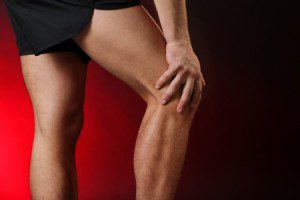Knee Injuries
 Knee injuries are a very common sporting injury not matter what level of sport or recreational activity. Physiotherapists provide expert advice and treatment to speed up the recovery following knee injury or surgery.
Knee injuries are a very common sporting injury not matter what level of sport or recreational activity. Physiotherapists provide expert advice and treatment to speed up the recovery following knee injury or surgery.
Types of Knee Injuries
Overuse injuries
Result from continuos activity such as cycling, running, jumping, weight training or walking.
Management Advice:
Physiotherapy treatment is essential to reduce the pain and disability associated with overuse knee injuries. In addition, physiotherapists are well trained to address potential aggravating factors that may have contributed to the development of the overuse injury.
Acute injuries
Result from a sudden shock, such as a fall, collision or twist of the knee.
Management Advice:
Many injuries may be successfully treated without surgery by physiotherapy treatment and rehabilitation. If damage is severe, surgery may be required. Physiotherapists work closely with medical practitioners, physicians and orthopedic surgeons to assist recovery and rehabilitation.
Prevention?
You may be able to reduce the severity of knee injuries by:
- Warming up and warming down before and after exercise
- Build your exercise program gradually
- Maintain good general fitness and flexibility through your quadriceps, calves and hamstrings.
- Improve your balance by standing on one leg
- Lots of knee injuries occur when skiing, make sure your bindings are properly fitted.
When Can You Return to Work/Sport?
Your physiotherapist can discuss with you your estimated time of return depending on the severity of the damage and your response to rehabilitation. Returning too early to work or sport often will delay the healing and prolong the recovery.
What To Do After A Sprain
As soon as possible and for at least 72 hours after injury, use the below RICE method:
R – REST – Only move within your limit of pain.
I – ICE – As soon as possible and for 20 minutes every two hours.
C – COMPRESSION – Firmly bandage the sprain including 5cm above and below.
E – ELEVATION – As much as possible, elevate the sprain higher than your heart.
Avoid any of the below HARM factors in the first 72 hours to prevent worsening the injury and lengthening your recovery.
H – HEAT
A– ALCOHOL
R – RUNNING
M – MASSAGE

